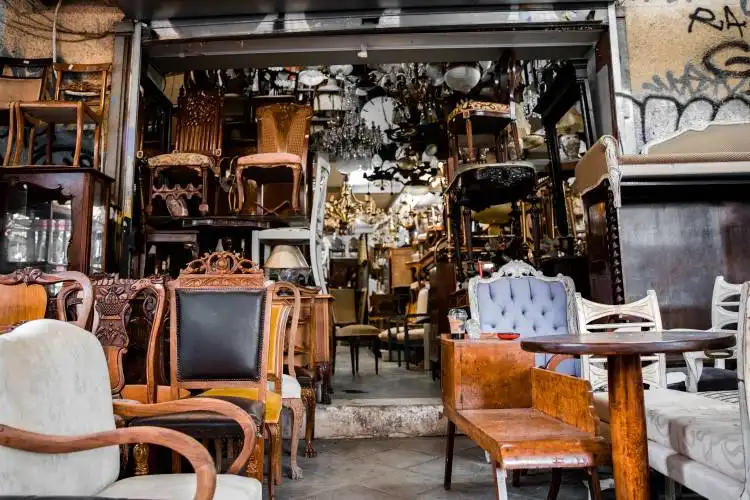Start a Liquor Store
Harnessing the Magic of Yeast and Grapes: Your Liquor Store Fantasy
| Updated


LIQUOR STORE
Jump into the thrilling world of the liquor store business, where an ever-evolving blend of sips, shots, and spirits awaits your entrepreneurial prowess. This venture not only specializes in selling an exhaustive variety of alcoholic beverages, from fine whiskeys to regional craft beers, but also in curating an atmosphere that educates and excites customers about their choices. As a new entrepreneur, imagine your store as a playground for aficionados and the curious alike, where each bottle uncorks a novel experience. Cheers to pouring profits into your journey!
Jump to Business Plan
RELATED BUSINESS IDEAS
Browse ALL Retail & Shopping Business Ideas
Discover Your Perfect Domain
Unlock the door to your online success with our hand-picked selection of premium domain names. Whether you're starting a new venture or rebranding an existing one, the right domain can set the tone for your digital presence. Browse through our curated list, each with its unique potential to enhance your brand's visibility and credibility.
LIQUOR STORE MINI BUSINESS PLAN
This a quick reality check to help you identify the strengths and weaknesses of your business concept before you dive in.
Expected Percent Margin:
- Gross Margin: 20-30%
- Net Profit Margin: 2-5%
Earnings Expectations:
- Daily Earnings: $500 - $1500
- Weekly Earnings: $3,500 - $10,500
- Monthly Earnings: $15,000 - $45,000
- Annual Earnings: $180,000 - $540,000
Actions to Hit Those Numbers:
Inventory Management:
- Initial Investment: At least $50,000-$150,000 for a varied and quality inventory.
- Supplier Relationships: Cultivate reliable connections with local breweries, wineries, and distilleries.
Marketing and Customer Acquisition:
- In-store Promotions: Highlight seasonal and special products.
- Community Connection: Participate in local events, offer tastings, and support other local businesses.
Sales and Customer Experience:
- Staffing: Hire 2-3 full-time employees who have a knowledge of liquor and customer service skills.
- Product Knowledge: Ensure staff are trained and able to advise customers about the products.
Cost Control:
- Rent: Choose a location where rent is less than 10% of expected monthly sales.
- Licenses and Insurance: Budget for the initial and ongoing costs for necessary liquor licenses and business insurance.
Business Operations:
- Store Hours: Consider long hours including weekends, consider local happy hours.
- Transaction Volume: Aim for around 50-100 transactions per day with an average sale price of $20-$30.
It's important to note that depending on location, state and local laws can significantly affect a liquor store's operations and profitability. Always consult with a knowledgeable local attorney and your financial advisor. Stay informed about the laws regarding the sale of alcohol, they will play a key role in your business model.
NOT WHAT YOU HAD IN MIND? Here are more ideas



Browse ALL Retail & Shopping Business Ideas
Grab Your Business Website Name
Before you get caught up in the whirlwind of setting up your business, invest in a domain name. It's a small but significant step that lays the foundation for your brand and makes it easier for customers to find and trust you. Just like you wouldn't build a house without securing the land first, don't build a business without securing your domain name.
"Why? Can't that wait?" Here's why it shouldn't
Step 1: Determine if Starting a Liquor Store is Right for You
Breakdown of Startup Expenses
Starting a liquor store requires a significant investment of both time and money. It is important to understand the startup costs associated with opening a liquor store, including the cost of the building, the cost of inventory, the cost of marketing and advertising, and the cost of any necessary licenses and permits. Additionally, the cost of hiring employees and any other necessary costs should be taken into consideration. It is important to research the local market and understand the competition in order to determine the best way to invest in the business.
Breakdown of Ongoing Expenses
In addition to the startup costs, there are ongoing expenses associated with running a liquor store. These include the cost of inventory, the cost of marketing and advertising, the cost of utilities, the cost of labor, and the cost of any necessary licenses and permits. Additionally, the cost of insurance and any other necessary costs should be taken into consideration. It is important to research the local market and understand the competition in order to determine the best way to invest in the business.
Examples of Ways to Make Money
There are several ways to make money with a liquor store. One way is to offer discounts on certain items or to offer special promotions. Additionally, offering special events and tastings can be a great way to attract customers. Additionally, offering delivery services or online ordering can be a great way to increase sales. Additionally, offering gift cards or loyalty programs can be a great way to increase customer loyalty and repeat business. Finally, offering catering services or special orders can be a great way to increase sales.
Step 2: Name the Business
Consider the type of liquor store you are opening When choosing a name for your liquor store, it is important to consider the type of liquor store you are opening. Are you focusing on craft beers, wines, or spirits? Are you offering a wide selection of products or focusing on a niche? Consider the type of liquor store you are opening and use that to help you come up with a name that is unique and memorable.
Brainstorm ideas Once you have an idea of the type of liquor store you are opening, it is time to brainstorm ideas for a name. Brainstorming can be a great way to come up with creative and unique ideas. Try to come up with a few different options so you can pick the one that you like the best.
Consider the location When choosing a name for your liquor store, it is important to consider the location. If your store is located in a small town, then you may want to choose a name that reflects the local culture or history. If your store is located in a larger city, then you may want to choose a name that is more modern and reflects the city’s vibe.
Check for availability Once you have a few ideas for a name, it is important to check to make sure that the name is available. You will want to check to make sure that the name is not already taken by another business. You will also want to check to make sure that the name is not trademarked or copyrighted.
Make sure it is easy to remember When choosing a name for your liquor store, it is important to make sure that it is easy to remember. You want customers to be able to remember your name so they can come back to your store. Try to pick a name that is easy to pronounce and spell. You may also want to consider a name that is catchy and memorable.
Step 3: Obtain Licenses and Permits
Local and State Licenses: Before opening a liquor store, it is important to obtain the necessary licenses and permits from the local and state governments. Depending on the state, the requirements for obtaining a liquor license can vary. Generally, the applicant must be at least 21 years of age, have no criminal record, and have the necessary financial resources to operate the business. Additionally, the applicant must have the necessary zoning permits and any other permits required by the local and state governments.
Federal Permits: In addition to the local and state licenses, a liquor store must also obtain a federal permit from the Alcohol and Tobacco Tax and Trade Bureau. This permit is required for any business that sells alcohol, and it must be renewed annually. The application process for a federal permit can take several months, so it is important to start the process as soon as possible. Additionally, the applicant must pay an application fee and provide proof of their financial resources. Once the permit is approved, the business can begin to operate.
Step 4: Find a Location
Accessibility When choosing a location for a liquor store, it is important to consider how accessible it is. It should be easy to find and have good visibility from the road. Additionally, it should be located in an area that is convenient for customers to access. Consider the amount of traffic in the area, the type of customers that frequent the area, and the competition in the area.
Size The size of the location is also important. The store should be large enough to accommodate the necessary inventory and staff, but not so large that it becomes too expensive to maintain. Consider the size of the store in relation to the size of the population in the area.
Security Security is a major factor to consider when choosing a location for a liquor store. The store should be located in an area that is safe and secure. Consider the crime rate in the area, the availability of security personnel, and the presence of surveillance cameras.
Regulations It is important to consider the local regulations when choosing a location for a liquor store. Make sure that the store is in compliance with all local laws and regulations. Consider the zoning laws, licensing requirements, and other regulations that may apply to the store.
Cost Finally, it is important to consider the cost of the location. The cost of the location should be taken into account when budgeting for the store. Consider the cost of rent, utilities, and other expenses associated with the location.
Step 5: Purchase Equipment
When starting a liquor store, there are several pieces of equipment that are necessary for the business to run smoothly. These include a cash register, shelving, refrigerators, and other storage units. Additionally, you will need to purchase liquor bottles, bottle openers, and other supplies such as cups, napkins, and straws. You may also need to purchase a point-of-sale system to help track sales and inventory.
Cost of Equipment
The cost of equipment will vary depending on the size of the store and the type of equipment needed. Generally, the cost of the equipment can range from a few hundred dollars to several thousand dollars. Additionally, you may need to purchase additional equipment such as a security system, a computer system, and other items. It is important to factor in the cost of the equipment when calculating the startup costs of the business.
Financing Options
When starting a liquor store, you may need to finance the purchase of the equipment. There are several financing options available, such as taking out a loan from a bank or other financial institution, using a credit card, or seeking out investors. It is important to consider all of the financing options available and determine which one is the best fit for your business.
Insurance
It is important to purchase insurance for the business in order to protect it from any potential losses. The type of insurance needed will depend on the type of business and the location. Generally, you will need to purchase general liability insurance, property insurance, and liquor liability insurance. Additionally, you may need to purchase workers' compensation insurance if you plan to hire employees.
Step 6: Stock the Store
When stocking the store, it is important to consider the types of liquor that customers are likely to purchase. A good selection of beer, wine, and spirits is a must. Consider the local market and what types of drinks are popular in the area. For example, if the store is located in a college town, it may be beneficial to stock a variety of craft beers and popular spirits. Additionally, consider stocking specialty liquors, such as flavored vodkas, cordials, and liqueurs. These can be used to create unique cocktails and attract customers who are looking for something different.
Suppliers
Once the types of liquor to carry have been determined, it is important to find reliable suppliers. Research local suppliers and compare prices to ensure that the store is getting the best deal. Additionally, consider ordering from online suppliers, as they may have access to a wider selection of products. Make sure to establish a good relationship with the suppliers, as this will help to ensure that the store is always stocked with the latest products.
Storage
When stocking the store, it is important to consider how the liquor will be stored. The store should have a temperature-controlled storage area to ensure that the liquor is kept at the proper temperature. Additionally, consider the layout of the store and how the liquor will be displayed. The store should be organized in a way that makes it easy for customers to find what they are looking for.
Security
Finally, it is important to consider the security of the store. Liquor stores are often targeted by thieves, so it is important to have a security system in place. Consider installing security cameras, alarms, and locks to ensure that the store is secure. Additionally, consider hiring security personnel to patrol the store and ensure that customers are following the store’s rules.
Step 7: Market the Store
Once the store is open, it is important to make sure that customers know about it. Advertising strategies should include both online and offline tactics. Online tactics may include creating a website, using social media, and creating email campaigns. Offline tactics may include creating flyers, using radio or television ads, and participating in local events. It is important to create a marketing budget and stick to it.
Networking
Networking is an important part of marketing the store. This includes attending local events, joining local business associations, and building relationships with other business owners. Networking can help to build relationships with potential customers and suppliers. It can also help to build relationships with local government officials and other influential people in the community.
Promotional Strategies
Promotional strategies should be used to attract customers to the store. This may include offering discounts, hosting special events, and offering loyalty programs. Promotional strategies should be tailored to the target audience and should be used to create a positive image of the store.
Online Presence
Creating an online presence is essential for any business. This includes creating a website, using social media, and creating email campaigns. The website should be easy to navigate and should include information about the store, its products, and its services. Social media should be used to engage with customers and to promote the store. Email campaigns should be used to keep customers informed about new products and services.
Step 8: Hire Employees
When hiring employees, it is important to look for individuals who have the right qualifications and experience. The most important qualities to look for are customer service skills, knowledge of the liquor industry, and the ability to follow instructions. It is also important to look for individuals who have a good attitude and are willing to learn. Additionally, it is important to make sure that the employees have the necessary certifications and licenses to work in the liquor store.
Training Employees
Once the employees have been hired, it is important to provide them with adequate training. This should include instruction on how to properly handle and store liquor, how to use the store's point of sale system, and how to provide excellent customer service. Additionally, it is important to provide employees with safety training, such as how to properly handle hazardous materials and how to safely use the store's equipment.
Establishing Policies and Procedures
It is important to establish policies and procedures for employees to follow. This should include policies on things such as dress code, attendance, and customer service. Additionally, it is important to establish procedures for handling customer complaints, handling cash, and stocking shelves. By having these policies and procedures in place, employees will be able to provide customers with a consistent and high-quality experience.
Establishing a Pay Structure
It is important to establish a pay structure for employees. This should include wages, bonuses, and other incentives. Additionally, it is important to establish a system for tracking employee hours and performance. By having a pay structure in place, employees will be motivated to perform their best and provide excellent customer service.
Step 9: Open the Store
- Introduction
Opening a liquor store is a big undertaking, but with the right preparation and research, it can be a successful venture. In this article, we will provide a step-by-step guide on how to start a liquor store in 9 steps. The first step is to determine if the business is right for you, which should include a breakdown of startup expenses and ongoing expenses. We will also provide examples on ways to make money. The second step is to name the business and tips on how to do so. Finally, the ninth and last step is to open the store and provide tips for a successful opening day.
- Understand Local Regulations
Before opening the store, it is important to understand the local regulations and laws regarding the sale of alcohol. This includes understanding the licensing requirements, taxes, and zoning regulations. It is also important to understand the rules and regulations of the state and local government. Additionally, it is important to be aware of any restrictions that may be placed on the sale of alcohol, such as age restrictions or hours of operation.
- Market the Store
Once all the necessary paperwork is taken care of, it is time to start marketing the store. This can include creating a website, setting up social media accounts, and creating promotional materials. Additionally, it is important to create relationships with local businesses and organizations to help spread the word about the store. This could include hosting events, offering discounts, and providing special offers.
- Stock the Store
Before opening the store, it is important to stock the shelves with the appropriate products. This includes researching the local market and understanding what types of products are in demand. Additionally, it is important to understand the pricing of the products and how to price them competitively. It is also important to understand the laws and regulations regarding the sale of alcohol, such as the types of products that can be sold and the minimum age for purchasing alcohol.
- Train Employees
Before opening the store, it is important to train employees on the laws and regulations regarding the sale of alcohol. This includes understanding the minimum age for purchasing alcohol, the types of products that can be sold, and the proper way to handle customer transactions. Additionally, it is important to train employees on customer service and how to handle customer complaints.
- Final Preparations
Before opening the store, it is important to make sure all the necessary paperwork is in order. This includes obtaining the necessary permits and licenses, as well as making sure all the necessary taxes are paid. Additionally, it is important to make sure the store is clean and organized, and that all the necessary safety protocols are in place.
- Grand Opening
Once all the necessary preparations are taken care of, it is time to plan the grand opening. This includes planning the event, creating promotional materials, and inviting local businesses and organizations. Additionally, it is important to create a memorable experience for customers, such as offering discounts or hosting special events.
- Monitor Performance
Once the store is open, it is important to monitor the performance of the store. This includes tracking sales, understanding customer feedback, and understanding the local market. Additionally, it is important to make adjustments to the store as needed, such as changing the product selection or adjusting the pricing.
- Open the Store
Once all the necessary preparations are taken care of, it is time to open the store. This includes making sure all the necessary paperwork is in order, stocking the shelves with the appropriate products, training employees, and planning the grand opening. Additionally, it is important to monitor the performance of the store and make adjustments as needed. With the right preparation and research, opening a liquor store can be a successful venture.
EXPLORE MORE CATEGORIES
Browse ALL Business Idea Categories
TAKE THE NEXT STEPS










